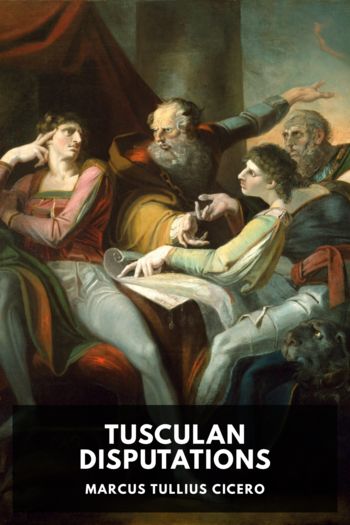Tusculan Disputations, Cicero [good book recommendations TXT] 📗

- Author: Cicero
Book online «Tusculan Disputations, Cicero [good book recommendations TXT] 📗». Author Cicero
Since I have spoken before of virtue in other places, and shall often have occasion to speak again (for a great many questions that relate to life and manners arise from the spring of virtue), and since, as I say, virtue consists in a settled and uniform affection of mind, making those persons praiseworthy who are possessed of her, she herself also, independent of anything else, without regard to any advantage, must be praiseworthy, for from her proceed good inclinations, opinions, actions, and the whole of right reason, though virtue may be defined in a few words to be right reason itself. The opposite to this is viciousness (for so I choose to translate what the Greeks call κακία, rather than by perverseness; for perverseness is the name of a particular vice, but viciousness includes all), from whence arise those perturbations which, as I just now said, are turbid and violent motions of the mind, repugnant to reason, and enemies in a high degree to the peace of the mind and a tranquil life, for they introduce piercing and anxious cares, and afflict and debilitate the mind through fear. They violently inflame our hearts with exaggerated appetite, which is in reality an impotence of mind, utterly irreconcilable with temperance and moderation, which we sometimes call desire and sometimes lust, and which, should it even attain the object of its wishes, immediately becomes so elated that it loses all its resolution, and knows not what to pursue, so that he was in the right who said “that exaggerated pleasure was the very greatest of mistakes.” Virtue, then, alone can effect the cure of these evils.
For what is not only more miserable, but more base and sordid, than a man afflicted, weakened, and oppressed with grief? And little short of this misery is one who dreads some approaching evil, and who, through faintheartedness, is under continual suspense. The poets, to express the greatness of this evil, imagine a stone to hang over the head of Tantalus, as a punishment for his wickedness, his pride, and his boasting. And this is the common punishment of folly, for there hangs over the head of everyone whose mind revolts from reason some similar fear. And as these perturbations of the mind, grief and fear, are of a most wasting nature, so those two others, though of a more merry cast (I mean lust, which is always coveting something with eagerness, and empty mirth, which is an exulting joy), differ very little from madness. Hence you may understand what sort of person he is whom we call at one time moderate, at another modest or temperate, at another constant and virtuous, while sometimes we include all these names in the word frugality, as the crown of all (for if that word did not include all virtues, it would never have been proverbial to say that a frugal man does everything rightly). But when the Stoics apply this saying to their wise man, they seem to exalt him too much and to speak of him with too much admiration.
Whoever, then, through moderation and constancy is at rest in his mind and in calm possession of himself, so as neither to pine with care nor be dejected with fear nor to be inflamed with desire, coveting something greedily, nor relaxed by extravagant mirth—such a man is that identical wise man whom we are inquiring for. He is the happy man, to whom nothing in this life seems intolerable enough to depress him, nothing exquisite enough to transport him unduly. For what is there in this life that can appear great to him who has acquainted himself with eternity and the utmost extent of the universe? For what is there in human knowledge or the short span of this life that can appear great to a wise man, whose mind is always so upon its guard that nothing can befall him which is unforeseen, nothing which is unexpected, nothing, in short, which is new? Such a man takes so exact a survey on all sides of him, that he always knows the proper place and spot to live in free from all the troubles and annoyances of life, and encounters every accident that fortune can bring upon him with a becoming calmness. Whoever conducts himself in this manner will be free from grief and from every other perturbation. And a mind free from these feelings renders men completely happy, whereas a mind disordered and drawn off from right and unerring reason loses at once not only its resolution





Comments (0)